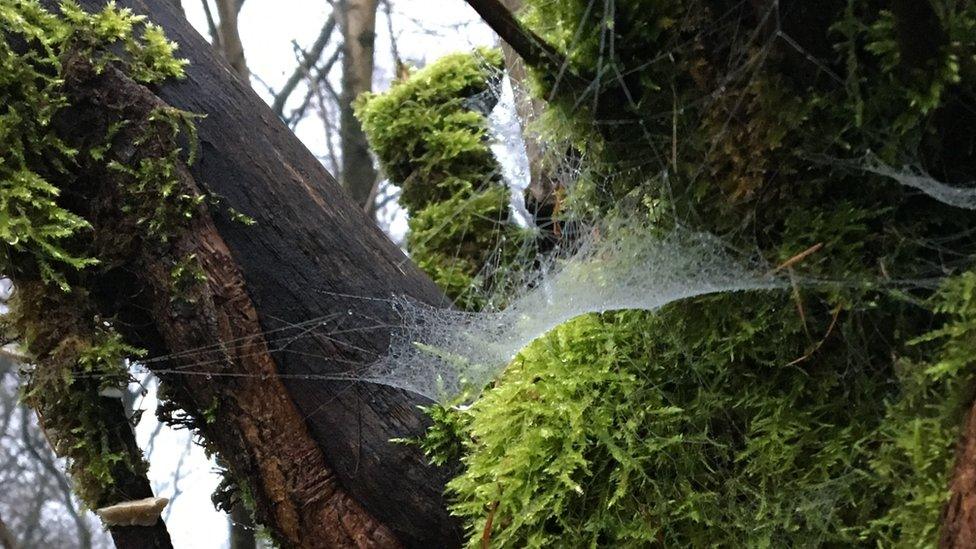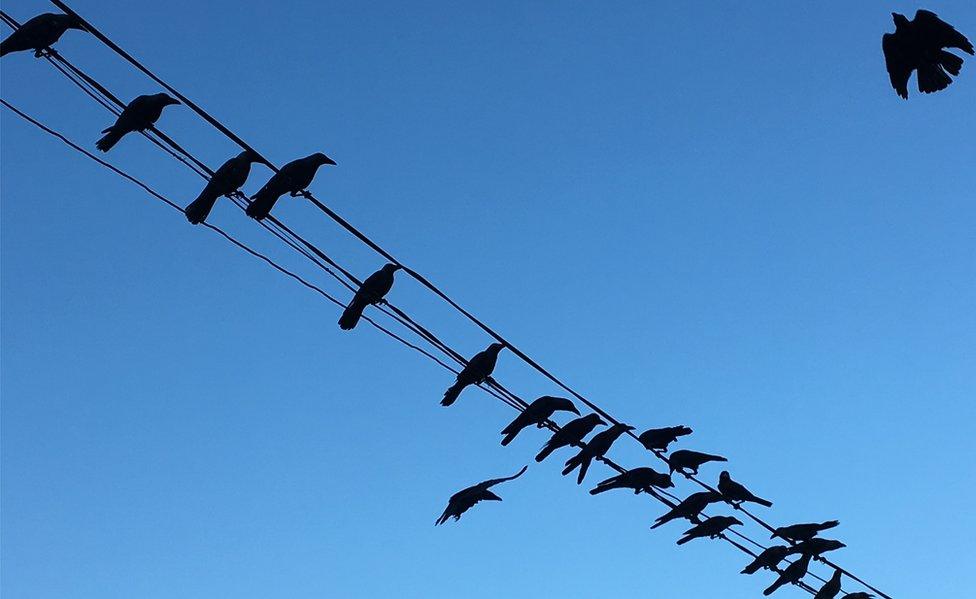Coronavirus lockdown: Can nature help improve our mood?
- Published

At a time when so many of us are facing a heightened sense of threat as well as deep worries about our future, can nature lift our spirits?
"Our current crisis has switched us out of normal existence and into survival mode," says Dr Anna Jorgensen, who researches the connection between environment and wellbeing at the University of Sheffield.
"We no longer see ourselves as quite so immortal," she says.
With far more people unable to work, or working from home, many have been inspired to explore nature in their neighbourhood as they refocus on their immediate surroundings.
As one Instagram user summed it up: "[It] takes a lockdown to find new paths from home. Escaped the 'office' to follow the River Trent winding through the floodplain at the bottom of our road, past gnarly old tree stumps and a statuesque heron."

As factory and car emissions have declined, there are fewer tiny particles in the air, so it's easier to see beyond built-up areas and to the stars in the night sky. Less city noise also highlights the sounds of birds.
There is also greater interest in gardening. Google Trends shows a doubling of worldwide online searches for compost and seeds compared with a year ago.
Can experiences in nature help us manage stress and anxiety?
While the impact of experiencing nature on our physical health is less well documented, a wealth of studies have demonstrated the positive effects, external of the natural world on our mental health.
Even a brief nature fix - 10 minutes of wind brushing across our cheek, or the sun on our skin - can lower stress, explains Dr Mathew White, from the University of Exeter.
If we immerse ourselves in beautiful landscapes, like a rich coastline or a wild forest teeming with an array of species, we feel more intense emotions, he adds.

Connecting with nature can help us feel happier and more energised, with an increased sense of meaning and purpose, as well as making tasks seem more manageable.
Dr Gretchen C Daily from Stanford University, in the US, uses this evidence, external to help the World Bank and city governments around the world develop policies to integrate the natural environment into our urban landscapes.
Nature-based activities, external, such as gardening and farming, have been used as part of mental health treatments around the world for centuries.
GPs in London, Liverpool and Dorset have been prescribing nature experiences for patients with depression and anxiety. These include a healthy walk or planting mint to nurture and grow.
Evidence indicates you can also benefit from "bathing" yourself in nature remotely. One experiment, external installed large plasma displays of real-time natural scenes outside an office, resulting in people's connection to their wider social community and the natural world increasing.

Sounds have a particular power to evoke memory, according to PhD researcher Alex Smalley.
So your feelings can be enhanced by listening to recordings of natural sounds, such as crashing waves or squawks of forest birds, external, after you've experienced them in person or watched a powerful film or programme featuring that landscape.
Dr Jorgensen believes seeing the recurrent rhythms and rebirth of nature, in which plants and animals survive despite the harshness of winter, can also offer us hope and help us cope with the tragedies in our lives.
Why does nature have such a positive effect?
Part of nature's power lies in its ability to wash away whatever is provoking a lot of our stress, explains Dr Daily.
Slow movements such as the ripples of water or clouds moving across the sky place effortless demands on our working memory but enough to distract us from spiralling rumination, self-blame and hopelessness.
Researchers call this capacity to hold our attention the "soft fascination", external of nature.
Tending to a plant helps us to appreciate the power we have to nurture, and gives us a sense of achievement when the plant flourishes, which Dr Jorgensen says is particularly important for those struggling with their mental health.
Tips to experience more nature

According to Dr White, the benefits are maximised, external if we can spend a total of two hours a week connecting with nature. The more senses we use - not only sight and sound but also smell, feel and taste - the greater the benefits.
Advice from the contributing experts includes:
Pay regular visits to a tree near where you live to see changes to the leaves, blossoms or seeds. Do particular birds visit? Does its bark host lichen, moss or insects?
Open a window to catch the sounds of leaves or scent of fresh rain, external.
Walk first thing in the morning, or before sunset, when the warm colours and low angle of light highlight the textures of the natural world, including tree trunks and leaves.
Plant seeds, using ones you find in fruit or near trees if you can't get hold of a packet. Cress seeds grow quickly on kitchen paper, without soil or a pot.
Think of nature when you are cooking, savouring the bright colours and tart flavours of fruits such as redcurrants. When you inhale your morning coffee, imagine the rainforest birds that help cross-pollinate coffee plants.
Incorporate natural design elements in your home, hanging branches or twigs on your walls or piling water-rounded stones on a shelf or windowsill.
Try ideas from the National Trust site, external 50 things to do before you are 11-and-three-quarters. Many are possible despite social distancing and whatever our age.
Additional Research by Kate Provornaya